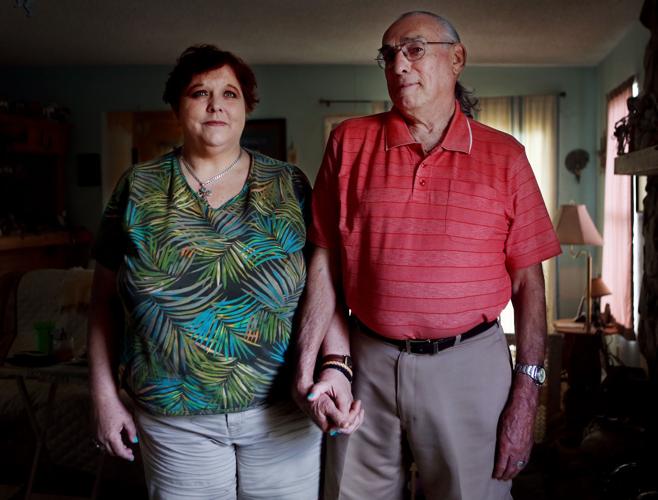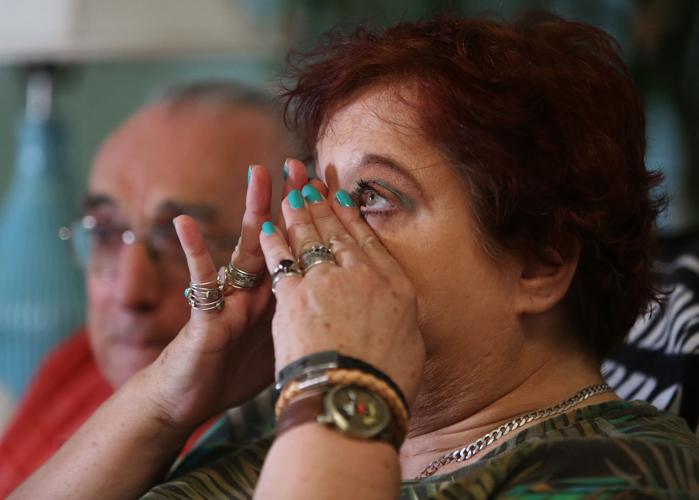A Tucson couple says they have no choice but to give up custody of their troubled son to circumvent an insurance company’s denial of high-intensity residential treatment.
The 14-year-old has started acting out his childhood sexual trauma on his peers, and his parents believe he could end up in prison as a sex offender if he doesn’t stop getting bounced between low-level, temporary placements.
“I don’t want to see him become a predator because he’s not getting the help he needs,” said Vivian Bacon, 57, a retired intake support specialist at the Pima County Sheriff’s Department. “He’s already 14. He’s got four years left before he’s out of our control.”
Bacon and her husband, Don, believe the teenager requires a Level 1 residential treatment center, where children are kept in highly controlled, locked-down settings staffed by medical professionals and attend school on site.
Local experts say residential care for troubled children was overused in the past, and research shows improvements children make in those facilities often evaporate once they return home. Long stays, sometimes out of state, isolate children from their families for months or years.
But the pendulum has swung in the other direction: Approval for such intensive and expensive care can be hard to come by, and there are no Level 1 residential treatment centers in Tucson.
Cenpatico Integrated Care — the new behavioral-health-care administrator for children in Southern Arizona — has closed Devereux Arizona’s 10-bed residential treatment unit.
Terry Stevens, Cenpatico CEO, said in most cases a robust network of “wraparound” support services for families is far better than institutionalizing a child.
“I’m really worried about traumatizing a child and removing them from a home and a community setting, in order to deal with disruptive behavior,” Stevens said. Company policy prohibits her from commenting directly on the Bacons’ case, she said.
Cenpatico is Southern Arizona’s regional behavioral health authority, or RBHA. In Arizona, RBHAs act like managed-care companies to coordinate and finance behavioral health care for children and adults enrolled in the state’s Medicaid program and to cover medical care for adults with serious mental illness.
The agency relies on referrals from providers like the Arizona’s Children Association, which recommended Level 1 residential treatment for the Bacons’ son in December.
“Member has been approved for Level 1 that can deal with his sexual maladaptive behaviors,” its Dec. 21 referral said.
But in January, Cenpatico denied that request, and the company denied the Bacons’ appeal on March 11.
Since Cenpatico started operating in Pima County in October, Stevens has been vocal about her opposition to Level 1 residential care for children.
“I don’t believe in it,” she said. “That doesn’t mean we don’t sometimes use it. I just don’t think it’s an effective therapeutic tool.”
Cenpatico suggested alternative placements for the teen. But all of those agencies — many of which focus on children with substance-abuse issues and do not specialize in sexual trauma — rejected the boy because his needs were too great, Vivian Bacon said.
Cenpatico now recommends a therapeutic foster home — where the teenager is placed currently with one other child — authorized for 60 days at a time and intensive support services when he returns home, Bacon said.
Abuse began early
Three years ago, Vivian and Don Bacon took in — and eventually adopted — her biological nephew after the boy told a youth pastor about the sexual, physical and emotional abuse he endured at the hands of his father and stepmother. The Star is not naming the teen because he was a victim.
But the Bacons no longer feel safe having him in their home.
“It got so bad I could not sleep at night for fear that this kid was going to come in and either kill us or hurt us,” Vivian Bacon said.
The boy was physically aggressive with his parents and threatened to kill himself repeatedly. He broke two ceiling fans, kicked a hole in the wall, broke their collectibles and urinated on the floor. He’s been asked to leave three schools for disruptive behavior. He has at least five times made inappropriate sexual advances on other children — a reaction to the sexual trauma he experienced, his parents say.
“The only way he knows to have a social relationship is sexually,” Vivian Bacon said.
The Bacons describe their son as a “survivor” — with an artistic streak and a talent for computers — who is coping with trauma the only way he knows how.
After his father took custody of him at age 3, the boy experienced both abuse and neglect, according to reports from his therapists, which the Bacons shared with the Star. His home had no food, and the boy slept on the floor amid mouse droppings. When he arrived at the Bacons’ house, he hoarded food and they had to teach him to eat with utensils.
His father is now in prison for armed robbery, and his birth mother is homeless in Tucson, dealing with addiction, the Bacons said.
The teenager has been diagnosed with post-traumatic stress disorder and bipolar I disorder, as well as depression and anxiety.
The Bacons believe placement in a highly controlled residential treatment facility — where he would get daily therapy and be constantly supervised — is the only way to give their son a chance at a productive life.
“We just think he has a future. We know he has a good heart,” Don Bacon said. “We don’t want to dump him in a residential-treatment center. But if he doesn’t get these types of treatment, eventually he’ll be in and out of prison.”
But after going into debt to pay for an earlier residential placement for their son last year, the couple can’t afford another without approval, and payment, from Cenpatico.
A lAST RESORT
As a last resort, the family plans to file a dependency petition this week in Pima County Juvenile Court. The petition will ask the court to turn over custody of their son to the Arizona Department of Child Safety, which will investigate their claim that they cannot care for him.
The action will trigger a review and could compel Cenpatico to justify its denials to a judge, said Tucson attorney Thea Gilbert, who is representing the Bacons.
The court might order Cenpatico to approve residential treatment if the case is strong enough, said Gilbert, a contract attorney with Juvenile Court.
She said she has represented hundreds of children and parents in child-welfare cases.
“At this point we have tried everything to get them (Cenpatico) to realize that the child needs more help than they are currently providing,” Gilbert said. “With a kid of this age, we have a very narrow window to get the behaviors under control, to teach him appropriate coping skills.”
PHILOSOPHICAL DEBATE
Decades as a child therapist have convinced Cenpatico’s Stevens that Level 1 residential treatment is never the best option.
“I was watching child after child go into residential-treatment facilities and coming out worse than they went in,” she said.
Cenpatico is pushing providers here to try every other option before resorting to institutionalizing a child.
The insurer is bolstering alternatives such as teaching parents behavior-management skills and providing intensive “wraparound” support by newly trained providers, Stevens said.
It has also implemented “brief intervention programs” — short-term, crisis-intervention placements — and is planning to open an assessment center in Tucson where children with extreme behavioral problems can stay temporarily and undergo psychological testing to determine the best treatment plan.
But Stevens acknowledges Level 1 residential treatment is sanctioned as valid by the state’s Medicaid agency, the Arizona Health Care Cost Containment System, or AHCCCS. Cenpatico has approved Level 1 residential care in the past, both in the rural region where it used to operate and now in the eight-county Southern Arizona region where it acts as the RBHA, she said.
Residential treatment should be the last resort, but there are cases where such a placement is appropriate, said Eric Schindler, child psychologist and CEO of Child and Family Resources in Tucson.
“It’s a philosophical debate,” he said. “Residential care had been overprescribed and is a very restrictive environment, and so I would agree that every attempt should be made to try intensive, wraparound services. But experts agree there are times where symptoms are so severe” that residential care is the best option.
In the year before Cenpatico took over, the previous RBHA — Community Partnership of Southern Arizona, or CPSA — placed 64 Pima County kids in level 1 residential treatment, for an average stay of 23 days, said Neal Cash, who was CEO of CPSA. The agency has reorganized as Community Partners Inc.
Cash said he agrees that long-term residential placements aren’t in a child’s best interest. But he supports having some local capacity for kids who need it short-term.
Devereux’s now-shuttered 10-bed Tucson facility usually had enough capacity to let kids stay near their families, he said. In 2015, each month between one and 12 kids were in residential treatment here, he said.
Now kids will have to go to another part of the state if they need that level of care. That’s increasingly likely as the state’s foster-care crisis continues, he said.
More than 18,600 children are in out-of-home care in Arizona — a staggering 92 percent increase since 2008.
“You gotta have a little bit of capacity” for residential treatment, Cash said. “The pendulum has swung. When you say ‘none,’ that’s pretty extreme.”
$40,000 treatment tab
Last year, before engaging with Cenpatico, the Bacons paid $40,000 to place their son at Eagle Ranch Academy, a licensed residential-treatment center in Utah.
The expense was hard on the retired couple, who live in a modest home near Davis-Monthan Air Force Base. Don spent 30 years in the Navy before he met Vivian in the early 1990s, when he worked at the Sheriff’s Department as a corrections officer.
Don, who is 75, cashed in a $100,000 life-insurance policy that he took out in the 1960s, which was intended to benefit his children . He got $18,000 from the policy.
The couple also took out a $25,000 loan that they’re still paying down.
After five months at Eagle Ranch, in November the teen was given 30 days to leave after making sexual advances on another child .
The boy needs “a higher level of care with a sexual abuse and possible predatory component,” his December discharge report said. “He is also in need of coping skills to deal with sexually inappropriate behavior and urges. He needs a staff-intensive environment with behavioral interventions.”
Rejected referrals
Stevens said residential treatment is approved only when kids have tried and failed at lower levels of care.
But, she said, “I would never put a child in a lower level placement if I believed they were going to fail at it.”
Casa de Tucson, a Level 2 residential-treatment center, was among the facilities that denied Cenpatico’s referral for the teenager.
He “appears to require one-to-one supervision and Casa de Tucson does not provide this type of high-level supervision,” the facility’s clinical director wrote in a rejection letter.
Anne Howarth, administrator at Casa de Tucson, would not discuss this specific case. But she said since Cenpatico took over, Casa de Tucson has had to reject more referrals.
“We’re getting more referrals for clients that have a much higher acuity level than we normally take,” she said. “Of course our responsibility, number one, is going to be to community safety.”





